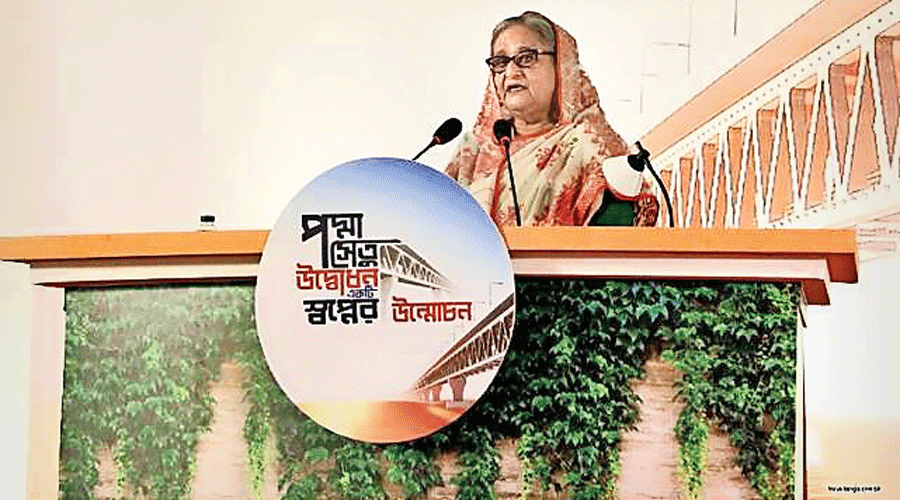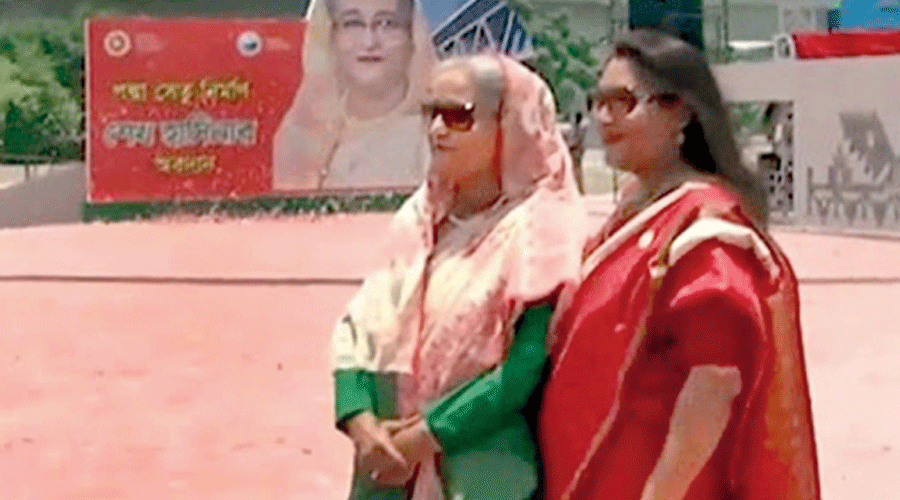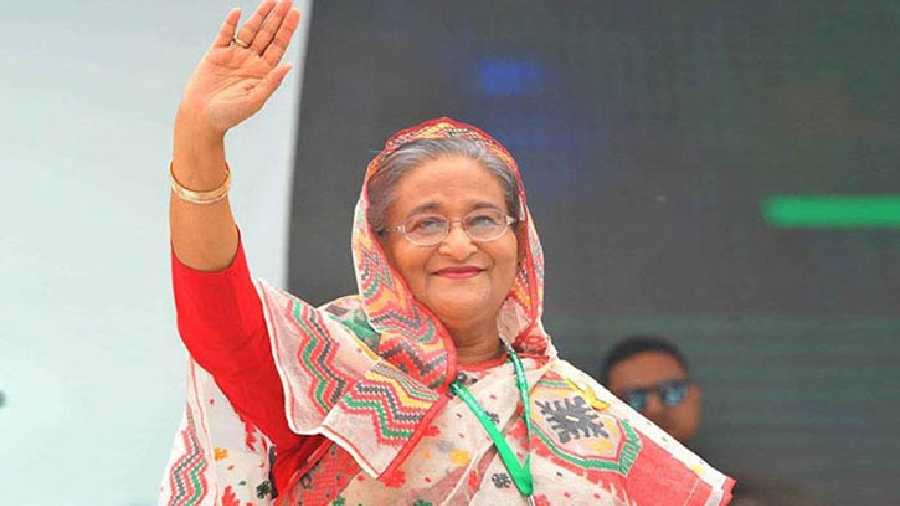A new brand of nationalism — “Padma nationalism” — swept Bangladesh on Saturday when Prime Minister Sheikh Hasina formally inaugurated a 6.15km bridge on the mighty river, marking a milestone in the country which celebrated its 50th year of independence in 2021.
“The Padma Bridge is not a pile of brick and cement.… It’s a symbol of Bangladesh’s pride, honour and ability. This is a sign of our resolve,” an emotional Hasina said at an event in Mawa, around 44km from Dhaka, a few minutes before throwing open the four-lane bridge to the country’s 17 crore people.
The government believes that the rail-road bridge — the rail deck is not yet complete — will bring a sea change to the lives of around 6 crore people living in 21 districts in the country’s southwest, besides bringing economic benefits across Bangladesh by improving connectivity and facilitating trade and commerce.
“The entire geography of Bangladesh, except a few islands, has become an integrated space. A person can travel from one corner of the country to the other without using ferry services.… The economic impact will be huge,” said Ashikur Rahman, an economist with the Policy Research Institute of Bangladesh.
The celebrations
As Hasina inaugurated the bridge, air force helicopters hovered overhead with Bangladeshi flags and fighter aircraft performed an aerobatics show.
The celebrations were not limited to the inauguration venue: hundreds of giant screens — 20-odd in Dhaka city alone — had been put up across the country’s 64 districts to beam the event live.
Over the past few days, Bangladesh had been waiting for this moment.
Giant billboards with visuals of the bridge, attractive captions and pictures of Hasina and her late father, Bangabandhu Sheikh Mujibur Rahman, had been installed at strategic locations. Landmark buildings, both private and government, had been lit up.
“We have such celebrations on important national days like December 16 (Victory Day) or March 26 (Independence Day)…. The inauguration of the Padma Bridge is being celebrated across the country. It’s Padma nationalism,” said Aynul Islam, associate professor in the department of political science, Dhaka University.
Although Opposition parties like the BNP have criticised the government for the pomp and show and urged it to spend the resources on flood-hit Sylhet, the excitement among ordinary Bangladeshis about the bridge was hard to miss.
“I am dying to use the bridge when it’s thrown open to the public on Sunday and visit my home in Jessore.… At times, we have to wait 12 hours for the ferry. It will take me just six minutes now to cross the river,” said Razaul Karim, a private sector employee in Dhaka.
Padma pride
Bridges are a critical component of a nation’s infrastructure and play an important role in boosting economic activity. The Padma Bridge is expected to push the country’s GDP up by over 1.23 per cent. But can a bridge stoke nationalism?
A significant majority in Bangladesh thinks it can.
In her 35-minute address, Hasina explained why the structure over the Padma, known for its turbulent waves, enormous depth and sprawling expanse, was not merely “a pile of brick and cement”.
Hasina had begun planning for the bridge way back in 1997 during a trip to Japan. Although she had got the feasibility study done, the BNP-led government that came to power in 2001 shelved the project. “We came back in 2009 and again started planning for the bridge,” Hasina said.

Hasina at the event in Mawa, around 44km from capital Dhaka, a few minutes before the inauguration of Padma bridge. The Telegraph
The Prime Minister recounted how “conspiracies” to derail the project — the World Bank opted out citing irregularities and corruption over the appointment of consultants for the bridge — delayed her dream of connecting the 21 southwestern districts with the rest of the country.
Hasina recalled that after the World Bank’s exit, she had announced in Parliament that the bridge would be built with Bangladesh’s own funds, and the construction began in 2015.
Although she did not name Nobel laureate economist Muhammad Yunus, believed to be behind the complaints that prompted the World Bank to leave the project, Hasina mentioned how a court in Canada had quashed the corruption allegations made by “vested interest groups”.
“Our people stood by us and I want to express my deepest gratitude to them.… I have nothing against those who said the bridge would not come up,” Hasina said.
“Many predicted that the economy would collapse if the bridge was built with our own funds.… Today, the Padma Bridge has been built. Bangladesh’s economy has not collapsed,” she added, taking a dig at her main political opponent, Begum Khaleda Zia of the BNP, without naming her.
Just the construction of the bridge has cost 13,000 crore takas, excluding other expenses that too were sizeable, government sources said.
They said that both Khaleda and Yunus had been formally invited to the inaugural programme, but neither turned up. Khaleda has been ailing for several months.
Political challenges
After the inauguration, Hasina’s cavalcade travelled across the bridge to Zajira, where she addressed a political rally organised by her party, the Awami League, as part of the celebrations. Over 10 lakh people attended the rally, where Hasina spoke about how her government had been delivering despite odds.
The speech, several political analysts in Bangladesh said, was her way of launching the campaign for the elections, scheduled for December 2023. Hasina is aiming for a fourth consecutive stint in power.
As Khaleda is indisposed and her exiled son Tareq Rahman has so far failed to lead the party, the BNP-led Opposition is in disarray. But that is hardly a source of comfort for the Awami League, with sections of voters disgruntled with the ruling party for several reasons, such as alleged corruption and highhandedness.
The impact of the pandemic and the Russia-Ukraine war has led to the prices of edible oil and food skyrocketing, making life difficult for the ordinary citizen.
Some economists think the government will have to take tough measures — such as jacking up interest rates — to contain the inflation. Higher interest rates will affect Bangladesh’s growth story, which will have a negative impact on the life of the ordinary citizen.
If the people’s economic woes escalate in the coming days, the dividends of “Padma nationalism” will fade away and the Opposition will, for all its lack of organisation, get some ammunition to attack the Prime Minister.
“Our Prime Minister brought the country out of an acute power crisis. She ensured trials of war criminals despite all odds, such as interference from parts of the western world. She also delivered the Padma Bridge despite conspiracies,” economist Ashikur said.
“This euphoria over the inauguration of the bridge may not be enough for the electoral battle, but she knows how to win by delivering.”












